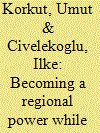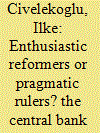| Srl | Item |
| 1 |
ID:
121249


|
|
|
|
|
| Publication |
2013.
|
| Summary/Abstract |
In August 2011 the Turkish prime minister Tayyib Erdogan arrived in
Somalia with a substantial delegation consisting of his family, ministers, and
civil society activists, along with Turkish celebrities, to highlight the need for
greater famine relief. In Mogadishu, Erdogan declared that the tragedy of
Somalia is a test of civilization and contemporary values.1
For any long-term
observer of Turkish interest in Africa, this visit seemed natural-an upshot
of Turkey's aspiration to become a regional power that "displays a superiority
in terms of power capabilities and exerts influence on shaping the regional
order."
2
|
|
|
|
|
|
|
|
|
|
|
|
|
|
|
|
| 2 |
ID:
116404


|
|
|
|
|
| Publication |
2012.
|
| Summary/Abstract |
This article examines the underpinnings of central bank (CB) reform in Turkey, with a focus on the role of external anchors, namely the European Union (EU) and the International Monetary Fund. It argues that although international actors played a substantial role in triggering CB reform in 2001, they failed to determine its parameters. The high costs of CB reform in the calculations of the ruling politicians allowed the Central Bank of the Republic of Turkey to gain partial operational autonomy, which fell short of fulfilling the Copenhagen criteria for accession to the EU. This article ends by arguing that due to the duration of high costs, the Bank continues to hold partial autonomy today.
|
|
|
|
|
|
|
|
|
|
|
|
|
|
|
|